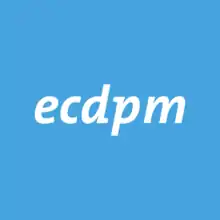European Centre for Development Policy Management
The European Centre for Development Policy Management, more commonly known as ECDPM, is a think tank founded in 1986. It is headquartered in Maastricht, Netherlands and has a second office in Brussels, Belgium.
 | |
| Abbreviation | ECDPM |
|---|---|
| Formation | 1986 |
| Type | Think Tank |
| Headquarters | Onze Lieve Vrouweplein 21, Maastricht 6211 HE |
| Location |
|
Director | Carl Michels |
| Website | http://www.ecdpm.org |
ECDPM researches Europe-Africa relations, aiming “to promote innovative forms of international cooperation involving European and African actors to address major global development challenges".[1]
Aims and objectives
ECDPM's mission is to "make policies in Europe and Africa work for inclusive and sustainable development."[1]
Thematic workstreams
ECDPM organises its work under 3 main thematic clusters and within each cluster, there are 10 workstreams:
Europe and Africa in the world
- EU foreign and development policy
- Migration and mobility
- Digital economy and governance
- AU-EU relations
Peaceful societies and accountable governance
- Peace, security and resilience
- Democratic governance and accountability
- Economic recovery and transformation
- Climate change and green transition
Sustainable African economies and climate action
- African economic integration
- Sustainable food systems[2]
Funding
ECDPM receives strategic and financial support from the governments of several countries, notably the Netherlands, Belgium, Austria, Ireland, Denmark, Estonia, Finland, Sweden and Luxembourg. Other institutions and organisations also. provide ECDPM with funding on a project basis.[3]
Partnerships
ECDPM collaborates with several think tanks, governments and other institutions to create webinar series,[4] interviews series [5] and papers and commentaries.[6]
ECDPM is part of the ETTG (European Think Tank Group) network.[7] Other think tanks in this network are ODI, Elcano Royal Institute, Istituto Affari Internazionali, the German Development Institute and IDDRI.
References
- "About ECDPM". ECDPM. Retrieved 8 March 2022.
- "Workstreams". ECDPM. Retrieved 8 March 2022.
- "Funding". ECDPM. Retrieved 8 March 2022.
- "Future of the EU-AU peace and security partnership". 15 February 2022.
- "Reflections on the European Financial Architecture for Development".
- "Collaborative efforts to stimulate sustainable investment for COVID-19 recovery in developing countries".
- "About". ETTG. Retrieved 8 March 2022.
External links
- ECDPM website
- Capacity.org
- ACP-EU trade website
- GREAT Insights – ECDPM's monthly magazine on economic development in Africa and the developing world. It gathers expert analysis and commentary from a number of perspectives.
- Weekly Compass Update – is a weekly electronic newsletter which focuses on the EU and its relations with countries in Africa, the Caribbean and the Pacific.